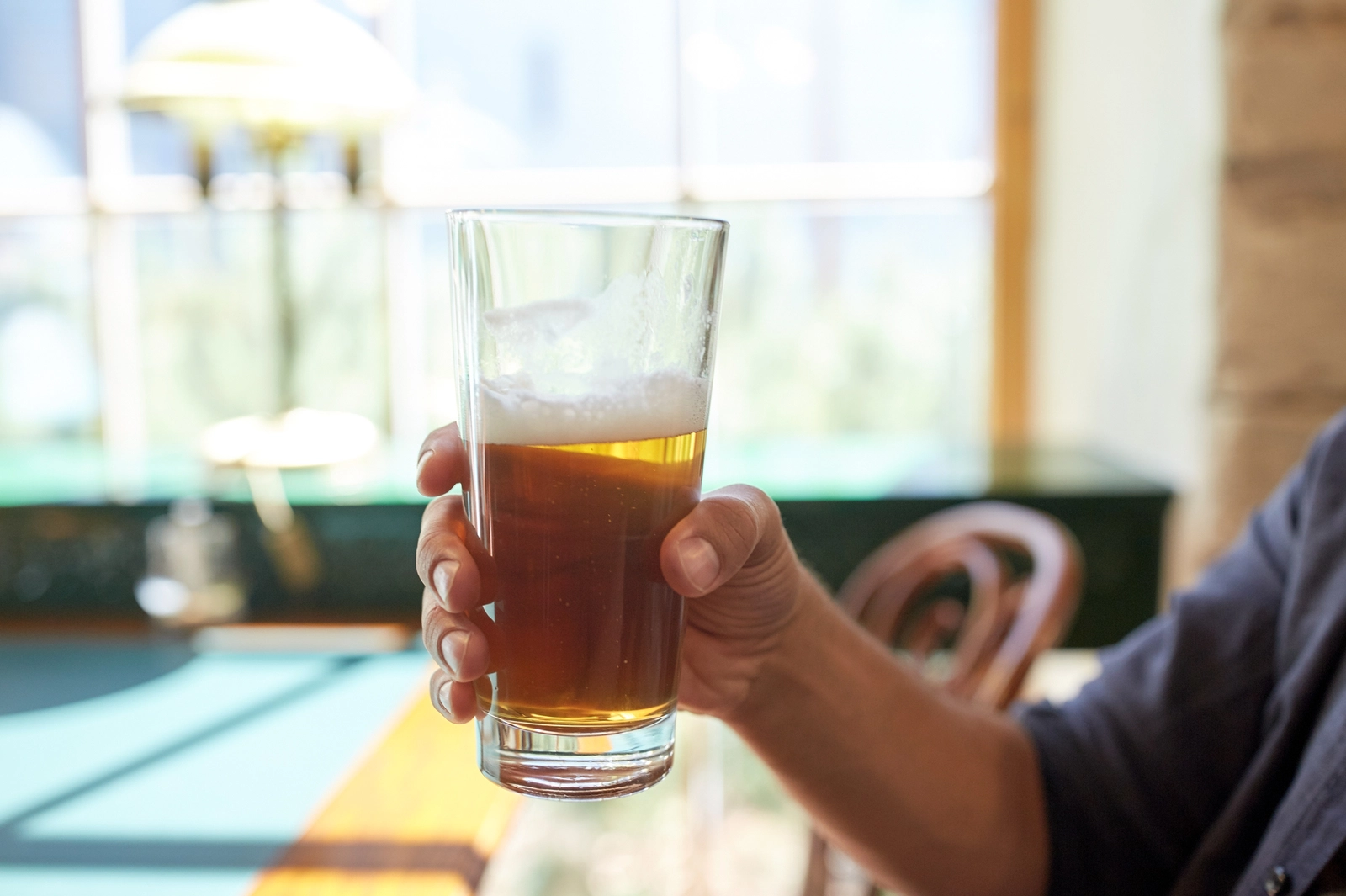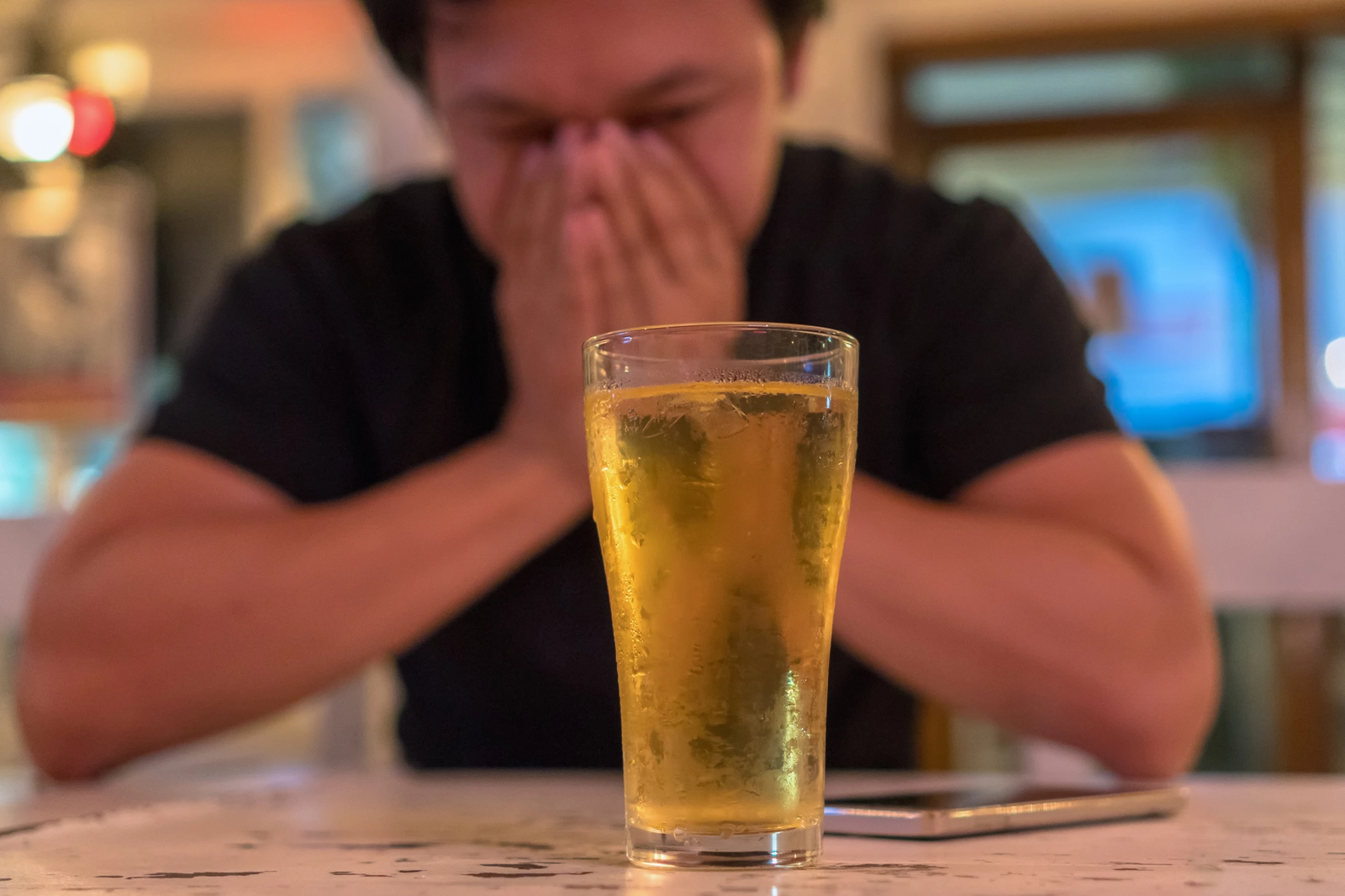Substances | 4 min read
Why Is There Blood in My Stool After Drinking Alcohol? Possible Causes and Risks
Medically Reviewed By

On December 2, 2024
Written By
On December 2, 2024

What you will learn
- Alcohol use can affect the gastrointestinal tract, which can cause blood in your stool.
- Bloody stool can be caused by several conditions, including liver disease, ulcers, and alcohol gastritis.
- There can be serious complications to blood in your stool, including anemia and worsening liver disease.
- Treatment for bloody stool depends on the cause, but if it’s related to alcohol, that may involve quitting alcohol and seeking treatment for alcohol addiction.
Many people engage in alcohol use knowing that it can have effects on your brain and mood, but it can affect more than just that. One of the ways alcohol can affect you is the digestive tract, including blood in your stool and other gastrointestinal problems.
Find out more about blood in your stool, what causes it, and how to seek treatment.
Alcohol’s Effects on the Gastrointestinal System
The digestive system is made of the liver, pancreas, and gallbladder, along with the entire gastrointestinal tract that begins at the mouth and leads through the esophagus, stomach, small intestine, and large intestine to the anus.
When you drink alcohol, it enters the bloodstream through the stomach and small intestine, where it’s distributed throughout the body. It’s then drained into the liver. Alcohol can affect multiple organs and functions in the digestive system from the point it enters until it’s metabolized and excreted.
Causes of Blood in Stool After Drinking Alcohol
Blood in your stool after drinking alcohol can have a range of causes, including:
Gastritis
Gastritis occurs when the stomach’s inner lining is inflamed, which can occur from alcohol use, trauma, infection, and more. Alcoholic gastritis, which is the term for gastritis caused by drinking too much alcohol or drinking alcohol too often, occurs when the stomach lining is continually irritated and eroded.
Gastritis may not always cause symptoms, but mild symptoms may be confused with indigestion. The symptoms may include:[1]
- A burning ache in the stomach
- Constant pain between the navel and ribs
- Belching and hiccuping
- A bloated or full feeling that’s worse after eating
- Nausea and vomiting
- Blood in the stool or vomit, which comes from bleeding in the stomach lining
Hemorrhoids
Alcohol consumption is not a direct cause of hemorrhoids, but it can indirectly contribute to their development.[2] Alcohol is a diuretic, which can cause dehydration and constipation. Straining during bowel movements can cause or worsen hemorrhoids. Drinking too much alcohol can raise blood pressure as well, which can stress the veins around the anus and increase the risk of hemorrhoids.
Liver Disease
The liver is an essential organ that digests food, removes toxins and waste, and produces clotting factors to keep the blood flowing well. Anything that can damage the liver, including alcohol, can cause liver problems.
Though liver disease doesn’t always cause symptoms that can be seen or felt, some symptoms may include:[3]
- Yellowing of the skin and whites of the eyes
- Belly pain and swelling
- Swelling in the legs and ankles
- Itchy skin
- Pale stool
- Fatigue
- Nausea or vomiting
- Loss of appetite
- Easy bruising
Over time, damage to the liver leads to scarring, known as cirrhosis. Blood in stool can be a symptom of liver disease, particularly in the later stages of cirrhosis, caused by bleeding varices. When the liver can’t process blood properly, blood pressure increases in the portal vein, which carries blood from the gut to the liver. This can cause varicose veins in the esophagus and stomach to burst, leading to internal bleeding with symptoms like black, tarry, or bloody stools.
Peptic Ulcers
Peptic ulcers are sores in the lining of the stomach or duodenum. Though there’s no evidence that alcohol can cause peptic ulcers, studies indicate that heavy alcohol use can make symptoms worse. Low amounts of alcohol use do not slow the healing of peptic ulcers, but heavy alcohol use and associated gastritis can exacerbate symptoms and increase the likelihood of developing ulcers.
Many people with peptic ulcers don’t have symptoms, but common symptoms may include:[4]
- Dull or burning stomach pain that may be worse after eating or at night
- Feeling of fullness or bloating
- Belching
- Heartburn
- Nausea
- Vomiting blood
- Dark blood in stools or stools that are black or tarry
- Feeling dizzy or faint
Inflammatory Bowel Disease (IBD)
Inflammatory bowel disease (IBD) comprises two main conditions involving chronic inflammation of the GI tract: Crohn’s disease and ulcerative colitis. Crohn’s disease and ulcerative colitis are both associated with symptoms of diarrhea, abdominal cramping, pain, and weight loss.
While there’s no definitive connection between alcohol use and the development of IBD, alcohol can trigger a flare for some people with these conditions and may cause diarrhea, belly pain and cramping, and blood in the stool.[5]
Risks of Blood in Stool from Alcohol Use
If you notice blood in your stool from alcohol use, it can lead to complications like:[6]
- Anemia: Persistent blood loss, even in small amounts, can cause anemia with fatigue, weakness, and shortness of breath.
- Severe bleeding: Conditions like varices from cirrhosis or bleeding ulcers can have a risk of life-threatening blood loss.
- Underlying conditions: Blood in your stool can signal underlying health issues, such as gastric polyps, liver disease, or stomach tumors.
When to Seek Medical Attention
If you notice blood in your stool, dark or tarry feces, or other gastrointestinal symptoms that are recurrent or persistent, talk to your doctor. Repeated episodes of bloody stool may indicate gastrointestinal damage or a chronic condition that warrants medical evaluation.
In addition, if you have other symptoms like a rapid heartbeat, pale skin, or fainting, you may have more serious blood loss that requires urgent medical attention. You should also seek immediate medical care if blood in the stool is accompanied by abdominal pain, vomiting, dizziness, or weakness.
Treatment for Blood in Stool
The treatment for blood in your stool depends on the underlying cause. However, if it’s caused or exacerbated by alcohol use, you’ll likely need to stop or significantly reduce your alcohol use. Some conditions may be associated with problematic alcohol use, which could indicate alcohol use disorder.
If you drink alcohol regularly, you must not quit “cold turkey.” Alcohol can lead to dependence over time, and sudden cessation in dependent individuals may result in alcohol withdrawal symptoms, which can range from mild to severe. The symptoms of alcohol withdrawal may include nausea, vomiting, insomnia, sweating, and shaking.[7] Some serious symptoms can arise, including hallucinations, seizures, and delirium tremens that can be life-threatening.
Because of the risks of alcohol withdrawal, the first step in treating alcohol addiction is often medical detox. This provides a medical team with 24/7 care to monitor your health, manage symptoms, and prevent complications while you withdraw.
Alcohol addiction can be difficult to overcome. Detox isn’t enough on its own, so you should consider undergoing alcohol addiction treatment in an inpatient or outpatient setting to address the underlying factors that contribute to addiction. This may include behavioral therapies, support groups, and individual or group therapy.
Get Help for Alcohol Addiction
Excessive alcohol use can have devastating effects on the body, including the gastrointestinal tract. If you’re noticing bloody stool or other worrying symptoms from alcohol use, seek medical help as soon as possible. Some conditions are progressive, so the earlier you seek treatment, the less likely you are to experience complications.
Frequently Asked Questions
Consuming too much alcohol can cause bloody stool from a range of conditions, including alcoholic gastritis, inflammatory bowel disease, ulcers, and liver disease. If you notice persistent blood in your stool, seek medical attention.
You should be concerned about blood in your stool if you have large amounts of blood clots in the stool, black or dark red stool, bloody diarrhea, or associated symptoms like lightheadedness, rapid heart rate, or weakness.
Yes, blood in your stool could be nothing serious, especially if it’s a small amount and doesn’t happen frequently. However, blood in your stool can be a sign of a more serious condition, particularly if you consume a lot of alcohol, so it’s best to seek medical attention if you’re concerned.
Ascendant New York Editorial Guidelines
Here at Ascendant New York, we understand the importance of having access to accurate medical information you can trust, especially when you or a loved one is suffering from addiction. Find out more on our policy.
[1] Gastritis. (2024, September 12). Johns Hopkins Medicine. Retrieved from https://www.hopkinsmedicine.org/health/conditions-and-diseases/gastritis on 2024, November 12.
[2] MediLexicon International. (n.d.-a). Alcohol and hemorrhoids: Possible links and more. Medical News Today. Retrieved from https://www.medicalnewstoday.com/articles/alcohol-and-hemorrhoids on 2024, November 12.
[3] Mayo Foundation for Medical Education and Research. (2024, February 13). Liver disease. Mayo Clinic. Retrieved from https://www.mayoclinic.org/diseases-conditions/liver-problems/symptoms-causes/syc-20374502 on 2024, November 12.
[4] Mayo Foundation for Medical Education and Research. (2024b, August 16). Peptic ulcer. Mayo Clinic. Retrieved from https://www.mayoclinic.org/diseases-conditions/peptic-ulcer/symptoms-causes/syc-20354223 on 2024, November 12.
[5] Swanson, G. R., Sedghi, S., Farhadi, A., & Keshavarzian, A. (2010). Pattern of alcohol consumption and its effect on gastrointestinal symptoms in inflammatory bowel disease. Alcohol, 44(3), 223–228. Retrieved from https://doi.org/10.1016/j.alcohol.2009.10.019 on 2024, November 12.
[6] Medical complications: Common Alcohol-Related Concerns | National Institute on Alcohol Abuse and Alcoholism (NIAAA). (2024, October 28). Retrieved from https://www.niaaa.nih.gov/health-professionals-communities/core-resource-on-alcohol/medical-complications-common-alcohol-related-concerns on 2024, November 12.
[7] Alcohol withdrawal: MedlinePlus Medical Encyclopedia. (n.d.). Retrieved from https://medlineplus.gov/ency/article/000764.htm on 2024, November 12.




